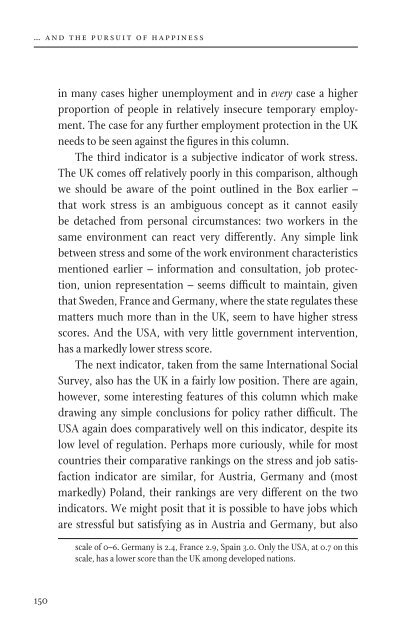… and the Pursuit of Happiness - Institute of Economic Affairs
… and the Pursuit of Happiness - Institute of Economic Affairs
… and the Pursuit of Happiness - Institute of Economic Affairs
Create successful ePaper yourself
Turn your PDF publications into a flip-book with our unique Google optimized e-Paper software.
<strong>…</strong> <strong>and</strong> <strong>the</strong> pursuit <strong>of</strong> happiness<br />
wellbeing at work: any lessons?<br />
in many cases higher unemployment <strong>and</strong> in every case a higher<br />
proportion <strong>of</strong> people in relatively insecure temporary employment.<br />
The case for any fur<strong>the</strong>r employment protection in <strong>the</strong> UK<br />
needs to be seen against <strong>the</strong> figures in this column.<br />
The third indicator is a subjective indicator <strong>of</strong> work stress.<br />
The UK comes <strong>of</strong>f relatively poorly in this comparison, although<br />
we should be aware <strong>of</strong> <strong>the</strong> point outlined in <strong>the</strong> Box earlier –<br />
that work stress is an ambiguous concept as it cannot easily<br />
be detached from personal circumstances: two workers in <strong>the</strong><br />
same environment can react very differently. Any simple link<br />
between stress <strong>and</strong> some <strong>of</strong> <strong>the</strong> work environment characteristics<br />
mentioned earlier – information <strong>and</strong> consultation, job protection,<br />
union representation – seems difficult to maintain, given<br />
that Sweden, France <strong>and</strong> Germany, where <strong>the</strong> state regulates <strong>the</strong>se<br />
matters much more than in <strong>the</strong> UK, seem to have higher stress<br />
scores. And <strong>the</strong> USA, with very little government intervention,<br />
has a markedly lower stress score.<br />
The next indicator, taken from <strong>the</strong> same International Social<br />
Survey, also has <strong>the</strong> UK in a fairly low position. There are again,<br />
however, some interesting features <strong>of</strong> this column which make<br />
drawing any simple conclusions for policy ra<strong>the</strong>r difficult. The<br />
USA again does comparatively well on this indicator, despite its<br />
low level <strong>of</strong> regulation. Perhaps more curiously, while for most<br />
countries <strong>the</strong>ir comparative rankings on <strong>the</strong> stress <strong>and</strong> job satisfaction<br />
indicator are similar, for Austria, Germany <strong>and</strong> (most<br />
markedly) Pol<strong>and</strong>, <strong>the</strong>ir rankings are very different on <strong>the</strong> two<br />
indicators. We might posit that it is possible to have jobs which<br />
are stressful but satisfying as in Austria <strong>and</strong> Germany, but also<br />
scale <strong>of</strong> 0–6. Germany is 2.4, France 2.9, Spain 3.0. Only <strong>the</strong> USA, at 0.7 on this<br />
scale, has a lower score than <strong>the</strong> UK among developed nations.<br />
to have jobs where <strong>the</strong>re is little pressure but <strong>the</strong> work is unsatisfying,<br />
as in Pol<strong>and</strong>. 19<br />
The final column shows a more recent measure <strong>of</strong> overall<br />
wellbeing at work. The New <strong>Economic</strong>s Foundation is a strong<br />
advocate <strong>of</strong> using wellbeing accounts to help determine economic<br />
policy, <strong>and</strong> to assist its argument it has used a series <strong>of</strong> questions<br />
in <strong>the</strong> 2006/07 European Social Survey, which covered 40,000<br />
respondents in 22 countries. In <strong>the</strong> case <strong>of</strong> wellbeing at work, it<br />
uses six questions 20 to produce a composite index with a ten-point<br />
scale. Again <strong>the</strong> UK is near <strong>the</strong> bottom, although again Germany<br />
is below <strong>the</strong> UK. Both <strong>the</strong>se countries, incidentally, show lower<br />
ratings on this wellbeing at work indicator than <strong>the</strong>y do on <strong>the</strong><br />
NEF’s wider measure <strong>of</strong> personal wellbeing, which covers such<br />
characteristics as having a satisfying life, self-esteem, optimism,<br />
resilience, competence <strong>and</strong> autonomy.<br />
Taking <strong>the</strong>se indicators toge<strong>the</strong>r, three European countries<br />
appear to perform consistently well: Austria, Irel<strong>and</strong> <strong>and</strong><br />
Denmark. They are each relatively small economies <strong>and</strong> have<br />
fairly homogeneous populations. They each have comparatively<br />
low levels <strong>of</strong> employment protection, but in o<strong>the</strong>r respects <strong>the</strong>ir<br />
labour market policies differ. Denmark spends much larger<br />
amounts on active labour market policies (retraining <strong>and</strong> reactivating<br />
those not in work) than <strong>the</strong> o<strong>the</strong>r two countries, <strong>and</strong> <strong>the</strong><br />
19 Conceivably <strong>the</strong> Polish case is to some extent a hangover from <strong>the</strong> communist<br />
period, when <strong>the</strong>re was little pressure on workers but conditions <strong>and</strong> pay were<br />
poor: as <strong>the</strong> cynical old line had it: ‘We pretend to work, <strong>and</strong> <strong>the</strong>y pretend to pay<br />
us’.<br />
20 The questions covered job satisfaction, work–life balance, interest in <strong>the</strong> job, proportion<br />
<strong>of</strong> <strong>the</strong> time <strong>the</strong> individual experienced stress in <strong>the</strong>ir job, <strong>the</strong> subjective<br />
likelihood <strong>of</strong> becoming unemployed in <strong>the</strong> next twelve months, <strong>and</strong> <strong>the</strong> appropriateness<br />
<strong>of</strong> <strong>the</strong> respondent’s pay.<br />
150 151












